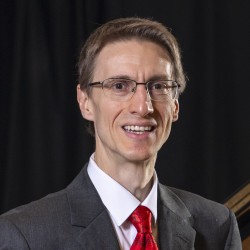Getting to know… Chris Wiley, Programme Lead Music BMus
Dr Chris Wiley, Programme Leader for our Music BMus, reveals what inspired him to get into the field, why you should study music and what he’s looking for in a student.

Why should students study Music at Surrey?
Music at Surrey offers students the widest possible choice to study in the areas you wish to develop, whether that’s performance, composition, or music history. Our programmes are founded on the principle that all musical traditions are integrally connected and that no one is superior to any other, so you’ll learn about classical and popular music alongside musical theatre, film music, opera, and contemporary music.
Collaboration with students on other programmes is encouraged and facilitated. You’ll have the opportunity for your concerts and studio sessions to be recorded by the Grammy- and Oscar-winners of tomorrow, who are studying on our award-winning Music and Sound Recording (Tonmeister) degree right now. You’ll also work alongside the technical wizards who create music with computers and electronics on our Creative Music Technology course.
Our academic staff are not only excellent teachers, but also active researchers at the forefront of advancing knowledge in their fields. 'The subjects of our Music Project and Topic Study modules rotate each semester according to the research interests and specialisms of the person teaching it, so we offer a unique education.
We seek to combine academic and practical study in all that we do, and we enjoy a particularly thriving culture of music performance. There are a range of ensembles you can choose from as well as many opportunities to perform as a soloist or in a student-led group in our custom-built performance and recording spaces, not least in our weekly lunchtime recital series.
Our position in national league tables speaks for itself: Surrey is ranked number 2 in the UK for Music in the Guardian University Guide 2024, number 5 in the UK for Music in the Complete University Guide 2025, and in the top 5 in the UK for Music in the National Student Survey 2023.
Music at Surrey is so vibrant – follow the Department’s Instagram to stay up to date on the wonderful things that happen here.
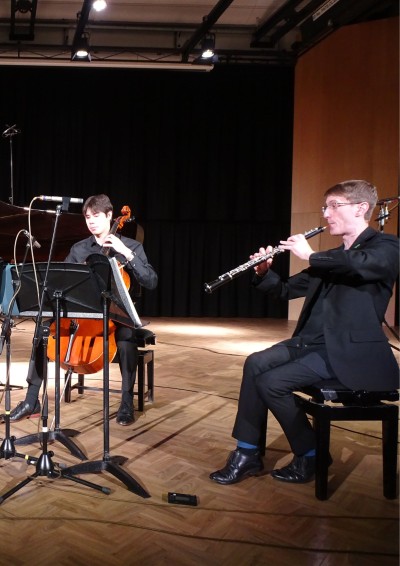
What excites you most about being Programme Lead?
The opportunity to learn more, every day. Of course, it can be challenging to keep up with everything – popular culture news, the latest musical theatre shows, new releases in popular music, recent trends and developments in the music industry – but it’s great to be constantly kept on my toes.
In one of my module assessments, students chose their own popular music artist and album to write about, applying the critical perspectives discussed throughout the module. It leads me to encounter music I wouldn't otherwise have known about, performed by obscure indie artists or singers in other languages who are unknown in the UK. It’s all very enriching!
As a performer, Surrey has given me the opportunity to engage with some very challenging repertoire. Earlier this year, I was asked to play in Britten’s Phantasy Quartet, Op 2 – we received coaching from professionals, made a studio recording of the piece working with our brilliant sound recording students, and performed it in two lunchtime recitals. And this was all the idea of a student!
"Earlier in the year, during a lecture on popular music and gender, I was leading a discussion on one of Beyoncé’s music videos which attracted the interest of an academic from another School, who stayed to listen at the back of class. It was a touching reminder that the topics we talk about on our Music degree are of widespread interest, and that it’s a privilege to be able to study it”.
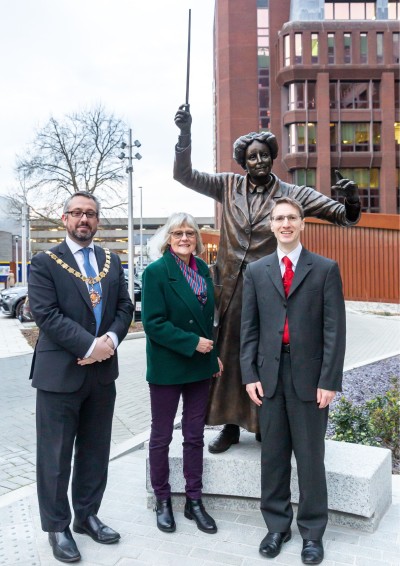
Who have you worked with in the past?
Students at the University of Surrey benefit from learning from academics who also work externally with a range of high-profile organisations. I’ve worked with several classical labels who have recorded music for commercial release using Surrey’s world-class facilities, including Retrospect Opera, of which I’m a trustee – we’ve just released our twelfth disc.
I’ve written programme notes for the BBC Proms and BBC Symphony Orchestra and Chorus, liner notes for several commercial CD releases, and over 60 reviews of live performance for Musical Theatre Review. I’ve addressed hundreds of people at pre-performance talks for Glyndebourne, Royal Philharmonic Orchestra, and concerts in major venues such as Southwark Cathedral and the National Musicians’ Church.
Two years ago, Woking Borough Council invited me to deliver the speech on the unveiling of the life-size statue of Dame Ethel Smyth in their town centre. That was a great honour as it’s one of only a couple of statues to women composers in the world.
I was also appointed the first ever International Distinguished Educator with Turning Technologies (a leading distributor of electronic voting systems) in the arts and humanities, which involved me with international consultancy developing their products, speaking at conferences across Europe, and delivering learning and teaching workshops at a dozen UK universities.
I frequently contribute to international media, television, and radio. In the past few weeks alone I’ve given an interview for NBC in America and appeared on Radio ABC in Australia. Some of my news items have been read by tens of thousands of people – it’s a valuable reminder that what we do here at Surrey is of great interest to so many people the world over.
“A couple of months ago, a parent approached me after one of our University Orchestra concerts. He commented that in the past few days alone, he’d seen me play harpsichord in a chamber ensemble, sing in the University Choir, and play oboe in the Orchestra, adding: ‘You have the coolest job in the University’ – and I think he’s right!"
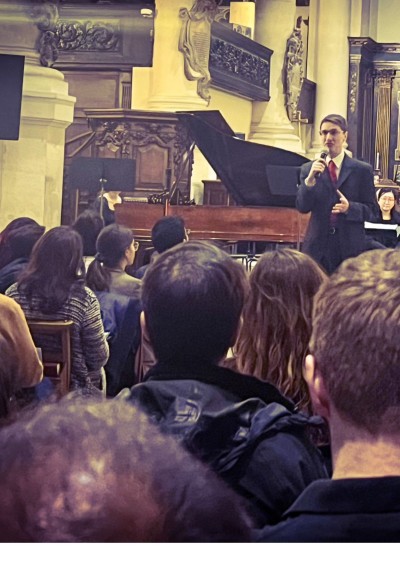
What are your interests outside of academia?
In addition to being a music educator and a researcher, I’m also a keen performer and concert-goer. So my primary interest outside of music academia is yet more music! This year I’ve performed on oboe, cor anglais, piano, church organ, harpsichord, voice, and even viola.
Our University music groups include our weekly Orchestra, a Community Orchestra that meets twice a year, our Choir and Chamber Choir, Big Band, String Orchestra, Concert Band, Jazz Orchestra, Brass Ensemble, the Musical Theatre Society, and many student-led ensembles and bands. Players are drawn from different years and programmes within our department as well as from across the University and the wider community of townspeople – so if you sing, play a musical instrument, or simply enjoy listening to music, it’s a great way to meet people.
Outside of music, I enjoy walking my lovely dog Nina – since I’m local, she’s known to many Surrey students. I also play tabletop role-playing games, for which my characters are invariably sorcerers, because using magic is such a game-changer: it can go very well but it can also go very, very badly! Finally, I play a diverting passive online game about hunting mice, around which a vibrant global community of players has developed, many of whom I’ve met in real life.
“My desk partner in String Orchestra is Campus Ambassador for the Institute of Physics, so last month we collaborated on a talk about ‘The Science of Musical Instruments’ for school children as part of the annual Institute of Physics lecture series. It was amazing to welcome so many school children from the local area to the University campus and to show them how the oboe works by cutting up paper straws, and what happens in slow motion when you strike a cymbal”.
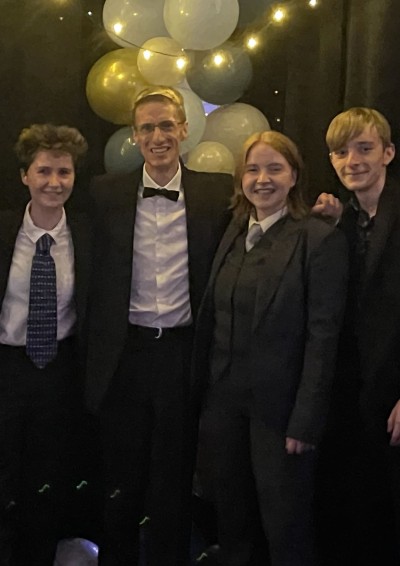
What do you look for in a UG student?
I’m looking for students who are interested and engaged in music and have attained the standard in their previous studies such that they will benefit from advanced tuition at university level. But mainly I’m keen to meet interesting people who I think will flourish here at the University of Surrey given the amazing teaching, resources, and opportunities we have to offer. At Interview Days I try to meet everybody in the room – parents as well as students – if I can.
One question I often ask at interview is what music an applicant has engaged with beyond their performance activity and their school or college studies, so that can I learn more about what makes them a rounded person and how they develop themselves outside of their formal study. I also like to find something that the applicant doesn’t already know, explain it to them, and see if I can help them understand it. That way, they’ll be able to tell whether they feel they can learn from me – as I’m always saying, interviews are a two-way process.
